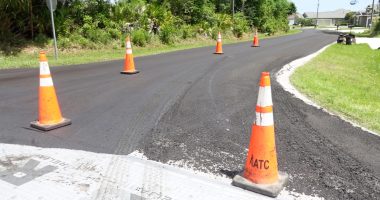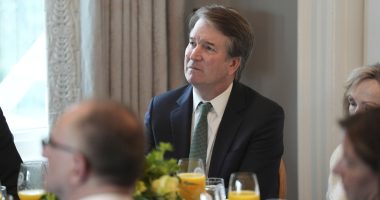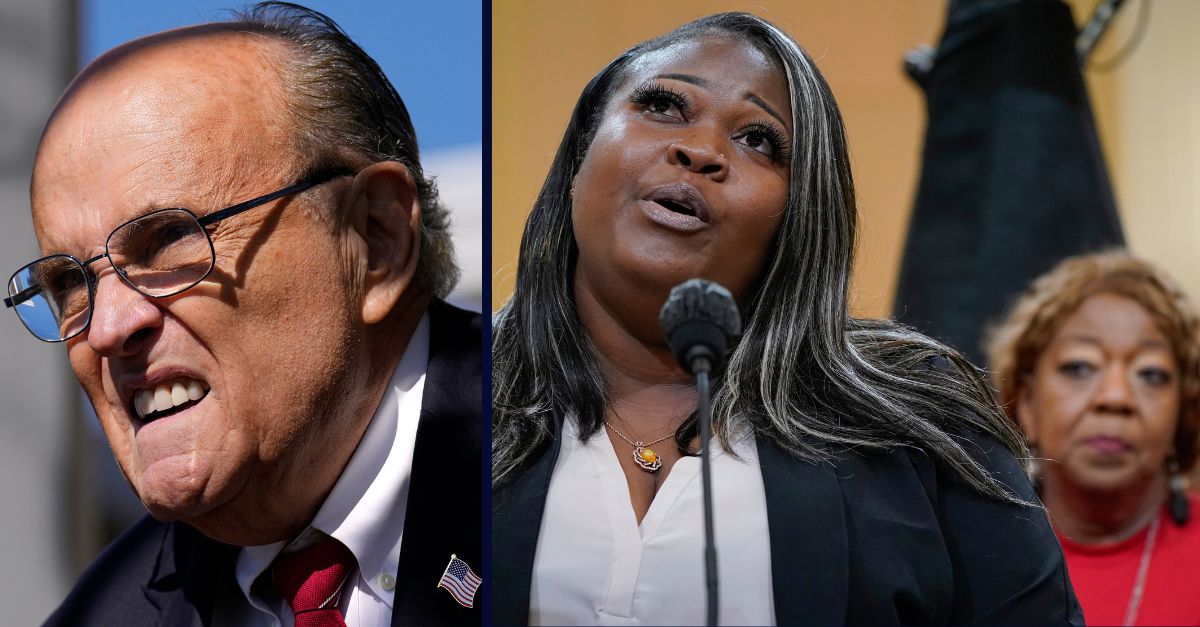
Left: Former New York City Mayor Rudy Giuliani (AP Photo/Charles Krupa)/ Right: Wandrea “Shaye” Moss, a former Georgia election worker, testifies as her mother Ruby Freeman listens (AP Photo/Jacquelyn Martin)
After creditors urged a bankruptcy court to appoint a trustee that would oversee Rudy Giuliani’s finances and companies last week, attorneys for the former NYC mayor, including a longtime friend, have formally renewed efforts to convince the judge to lift a stay and allow an appeal in the U.S. Court of Appeals for the D.C. Circuit of the $148 million defamation judgment Georgia election workers Ruby Freeman and Shaye Moss won by default in December as a sanction for discovery non-compliance.
During the hearing two Mondays ago, U.S. Bankruptcy Judge Sean Lane expressed no interest in discussing Giuliani’s reargument of a previously denied motion to lift the stay, noting that the reason why everyone was in court that day was to hear from lawyers representing Dominion Voting Systems, Shaye Moss, and former Giuliani employee Noelle Dunphy, who has sued Giuliani accusing him of sexual assault, and to hear from Giuliani’s team on the issue of the trustee.
The Official Committee of Unsecured Creditors and the law firm Akin Gump Strauss Hauer & Feld LLP were clear on their view that “immediately” appointing a trustee is of paramount importance for propelling the bankruptcy case forward in a meaningful way, since Giuliani did not file monthly operating reports on time as part of a “disturbing pattern” of failing to comply with court orders and otherwise displaying “dishonesty,” “incompetence,” “gross mismanagement,” and “inappropriate relations between the Debtor and his wholly-owned businesses,” such as the “alter ego LLC” Giuliani Communications.
Lane at one point of the hearing hinted that “gross mismanagement” might be cause for appointing a trustee, and in closing the judge remarked that the “record in this case suggests that I should be extremely concerned.”
But before Lane’s parting shots, where he reiterated “[t]here are reasons to be very concerned here,” there were some notable exchanges between the judge and Giuliani attorney Gary Fischoff.
Fischoff insisted during the trustee-focused hearing that his client must be allowed to appeal the Freeman judgment, since there are “150 million reasons why” that is necessary.
Lane responded that he already refused to lift the stay before because of his “concern that the debtor views the [bankruptcy] case solely about appealing that litigation.” And, in any event, the hearing that day was about whether or not to appoint a trustee, not whether or not to lift the stay, the judge said.
Fischoff nonetheless tried to let the court hear from Kenneth Caruso, an attorney whose friendship and professional ties with Giuliani go back to 1977, but Lane shut that down since a motion on the subject of lifting the stay was not before the court.
Through Fischoff, Caruso in April said he would he would bring a “fresh perspective” when it comes to appealing the defamation judgment in the D.C. Circuit — and Giuliani’s team emphasized it is critically important that the appeal succeed.
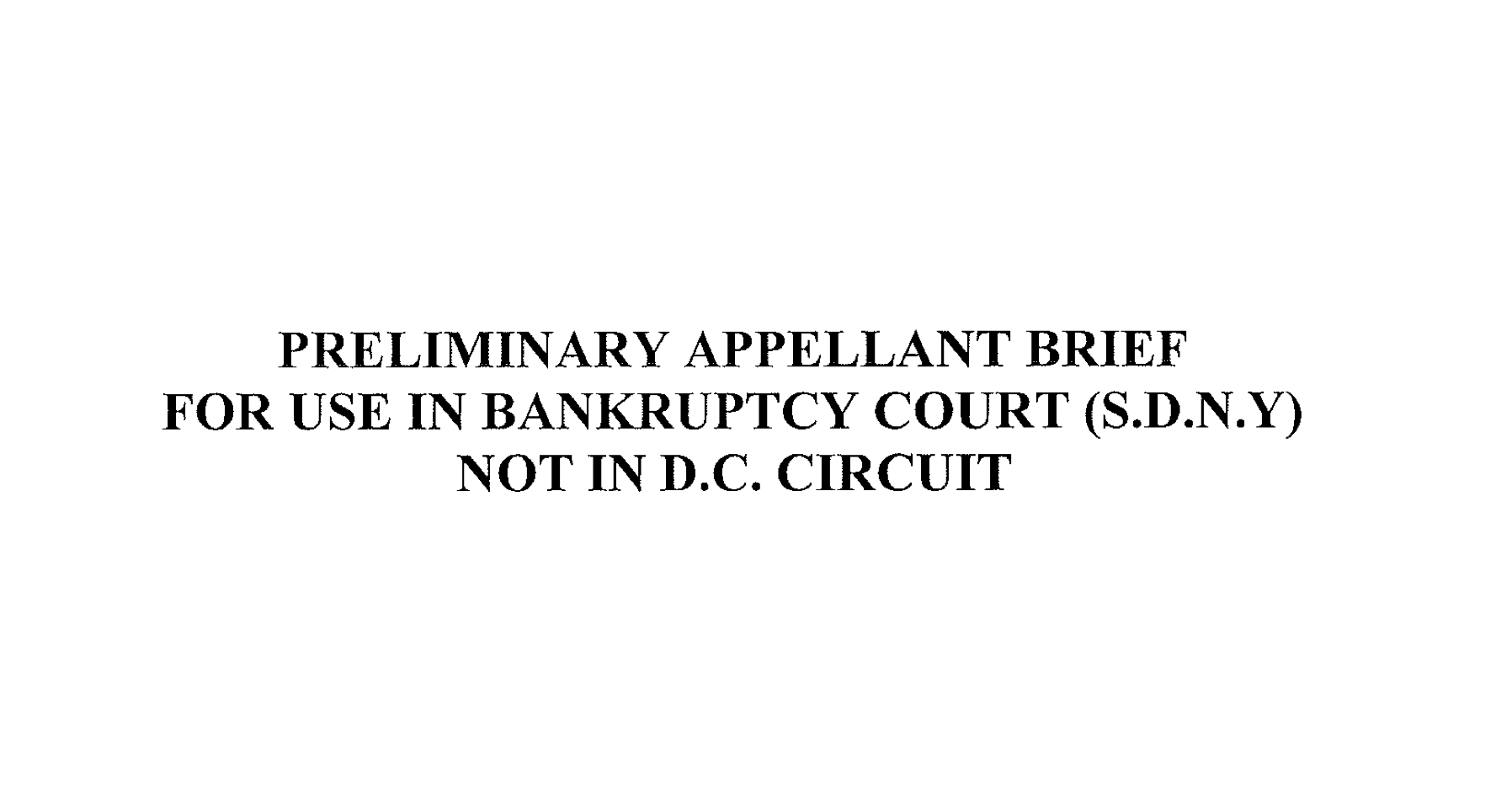
On Wednesday, Fischoff not only filed a “renewed” motion highlighting several factors in support of lifting the stay, but he also attached as an exhibit a preliminary appellate brief outlining arguments Caruso would make in Washington, D.C., if only Lane were to allow that course of action.
After Giuliani was found liable for defaming poll workers Ruby Freeman and Shaye Moss by accusing them of playing a role in stealing the 2020 election from Donald Trump in Georgia while they worked at State Farm Arena in Fulton County, a jury unanimously determined that $148 million in compensatory and punitive damages was the appropriate penalty for defamation and intentional infliction of emotional distress “caused by Mr. Giuliani and his co-conspirators[.]”
The false claims, the mother and daughter publicly testified, led to a barrage of harassing and threatening letters, emails, texts and calls.
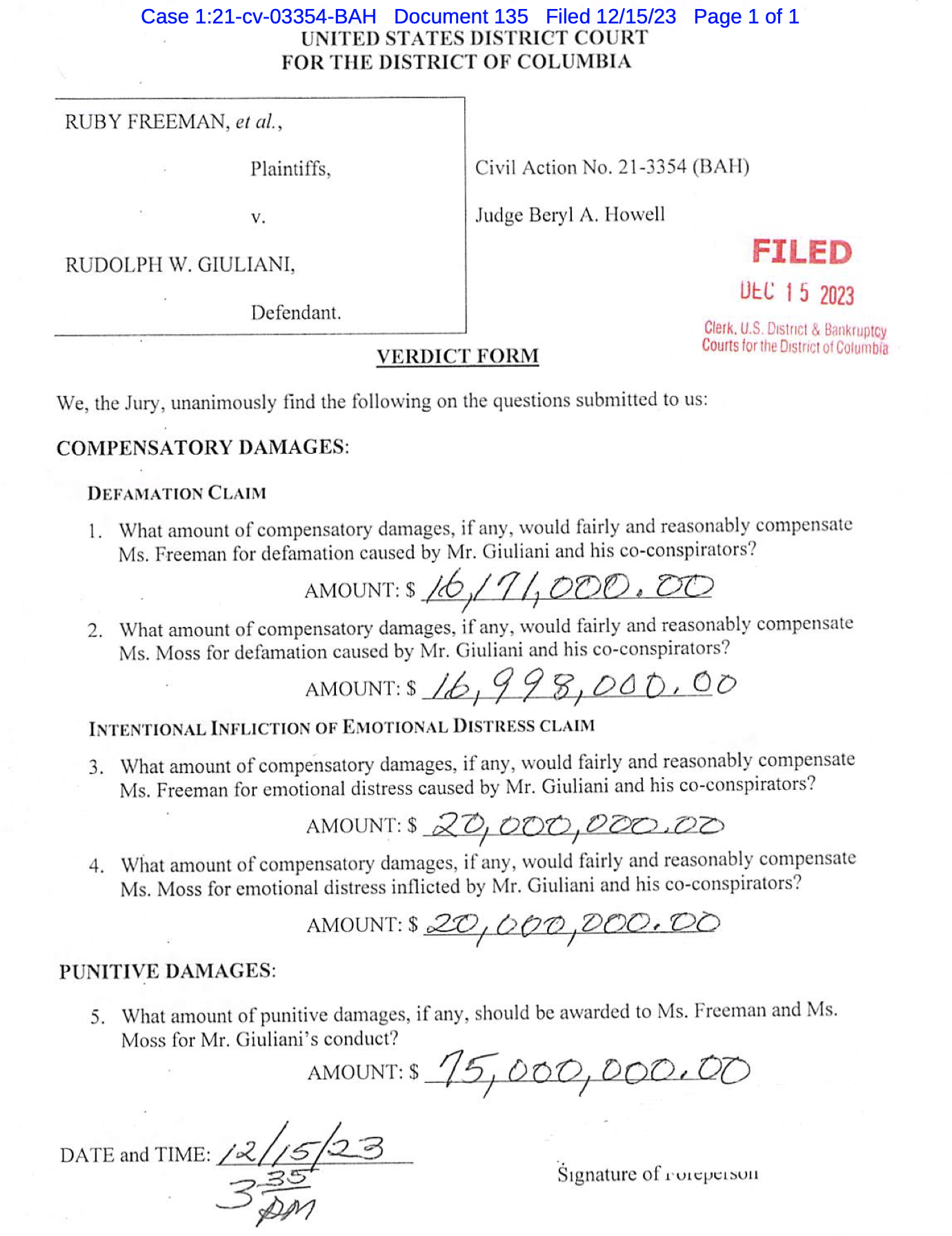
Giuliani’s desire for an appeal and eventually reduced or eliminated judgment, Caruso’s draft brief reveals, would make the case that the Freeman and Moss lawsuit didn’t sufficiently allege “actual malice,” fell short of “adequately” alleging “liability on a theory of civil conspiracy,” and/or failed to “state a claim for intentional infliction of emotional distress,” and/or didn’t show that Giuliani’s “pure speech relating to a matter of legitimate public interest” amounted to “extreme and outrageous conduct.”
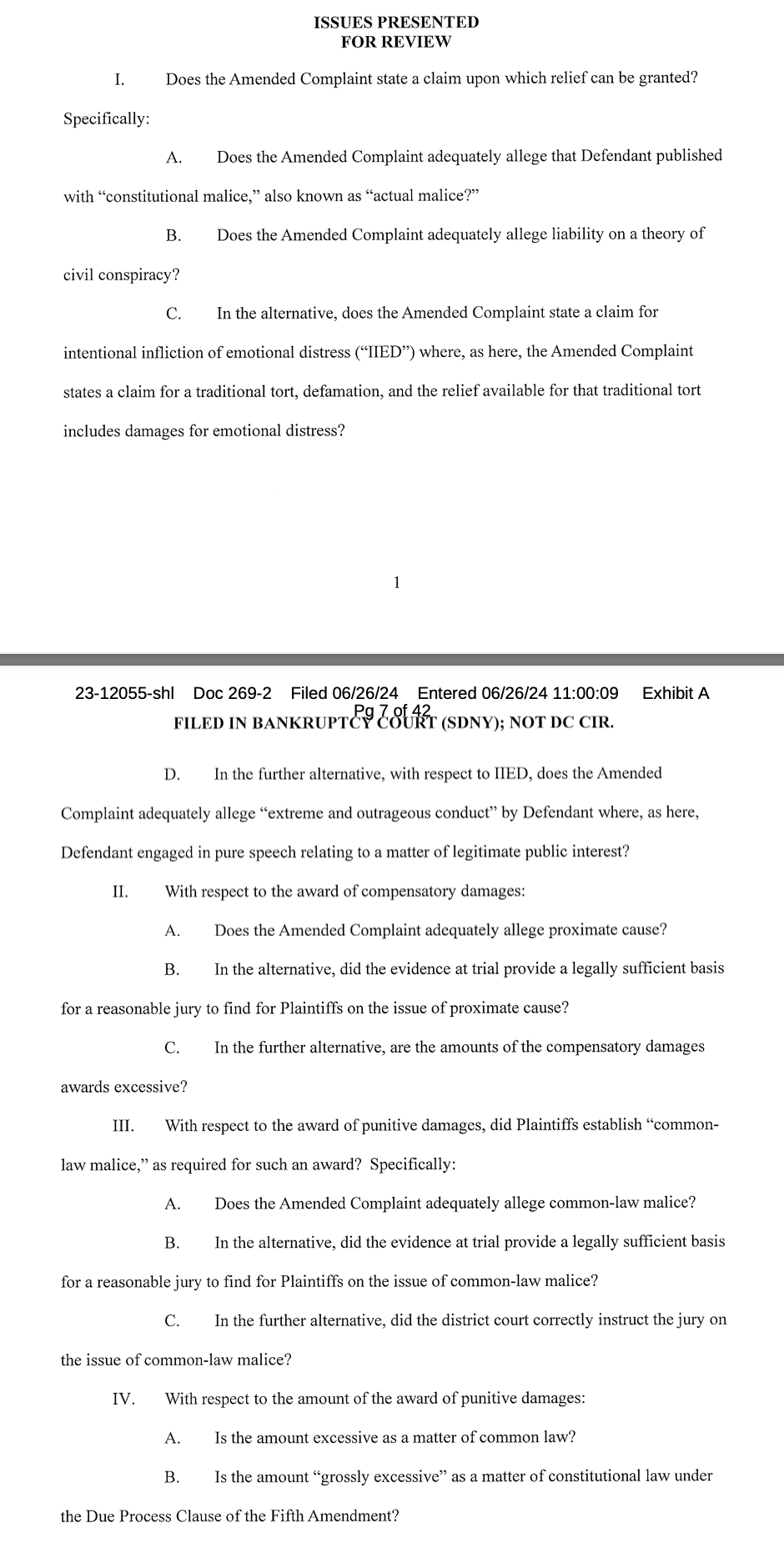
Giuliani’s potential Freeman judgment appeal arguments.
In further support of seeking a new trial or, in the case best scenario, convincing the D.C. Circuit to toss out the judgment and the Freeman case as a whole, Caruso would challenge the punitive damages award as “grossly excessive as a matter of constitutional law.”
In the preliminary brief, Caruso asserted that Giuliani was wrongly and excessively punished for the way others reacted to his “pure speech.”
“Defendant’s conduct—as distinct from the conduct of the strangers who heard read Defendant’s publications—was not at all reprehensible,” the attached exhibit said. “Defendant engaged in pure speech, concerning an important matter of politics and government—a Presidential election.”
While acknowledging as true that Giuliani’s “listeners and readers engaged in reprehensible conduct,” the actions of those individuals were not Giuliani’s.
“Plaintiffs, at trial, emphasized the acts of others, referring repeatedly to those acts, such as the attempted home invasion, harassing phone calls filled with profanities and sexual and racial slurs, and more,” Caruso wrote. “This case therefore presents a high likelihood—an unacceptably high likelihood, Defendant submits—that the jury, through its massive award sought to, and did, punish the Defendant for the conduct of others.”
Unlike Freeman and Moss, Giuliani ultimately did not testify at the trial.
Outside of court but days before the defamation judgment came down, Giuliani reportedly said “Of course I don’t regret it” and “They were engaging in changing votes.”
At the bankruptcy hearing last week, Rachel Strickland, an attorney for the Freeman plaintiffs, said that Giuliani is “not a doddering 80-year-old” but is instead “shrewd.”
More Law&Crime coverage: Giuliani agrees to permanent injunction on his speech over ‘false and defamatory’ statements about Georgia election workers
Noting that Giuliani in May agreed to a permanent injunction barring him from repeating defamatory statements about Moss and Freeman, Strickland cited a June 3 Giuliani post on X that the attorney said was clearly about her clients, even though the post didn’t name Moss and Freeman.
“The 2020 election was stolen. We have sworn affidavits, countless testimonials, eyewitness accounts, and irrefutable evidence showing examples of voter fraud, including video of ballots being run through counting machines two and three times,” the Giuliani post in question said. “I refuse to be silenced.”
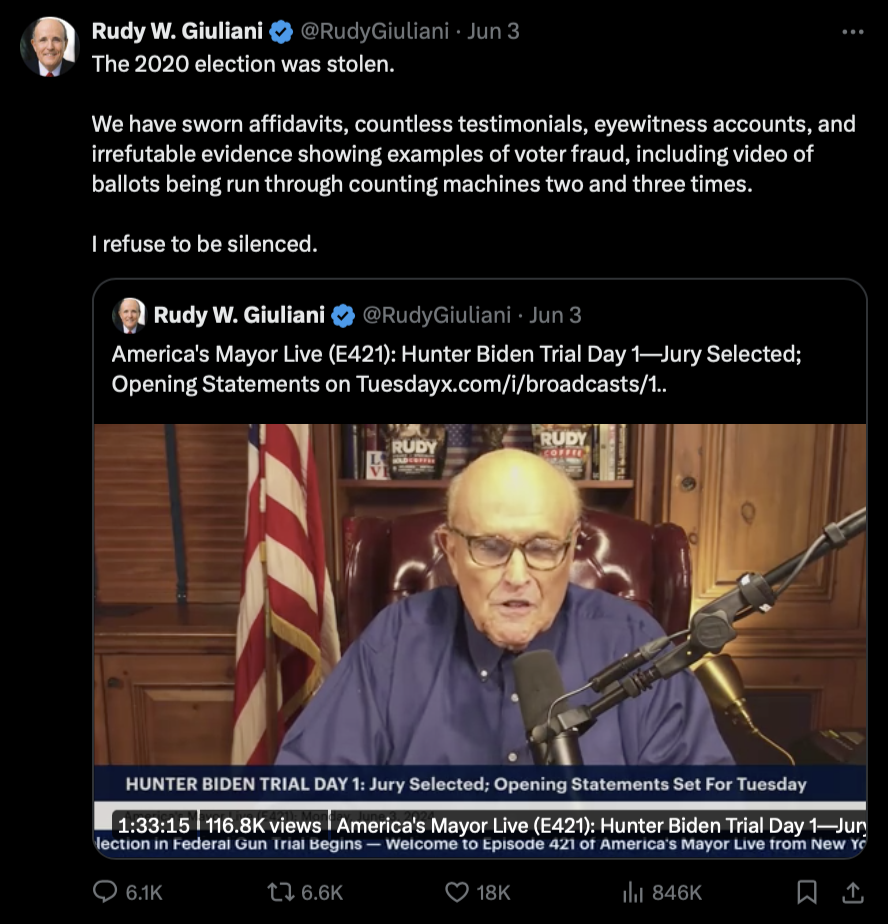
Giuliani’s June 3 post which came up during June 17, 2024, bankruptcy hearing.
Strickland said that the “ballots being run through counting machines two and three times” statement referenced Giuliani’s false claims about Moss and Freeman, even though his agreeing to an injunction meant he has “knowledge of a legal obligation to be silent.”
Have a tip we should know? [email protected]

